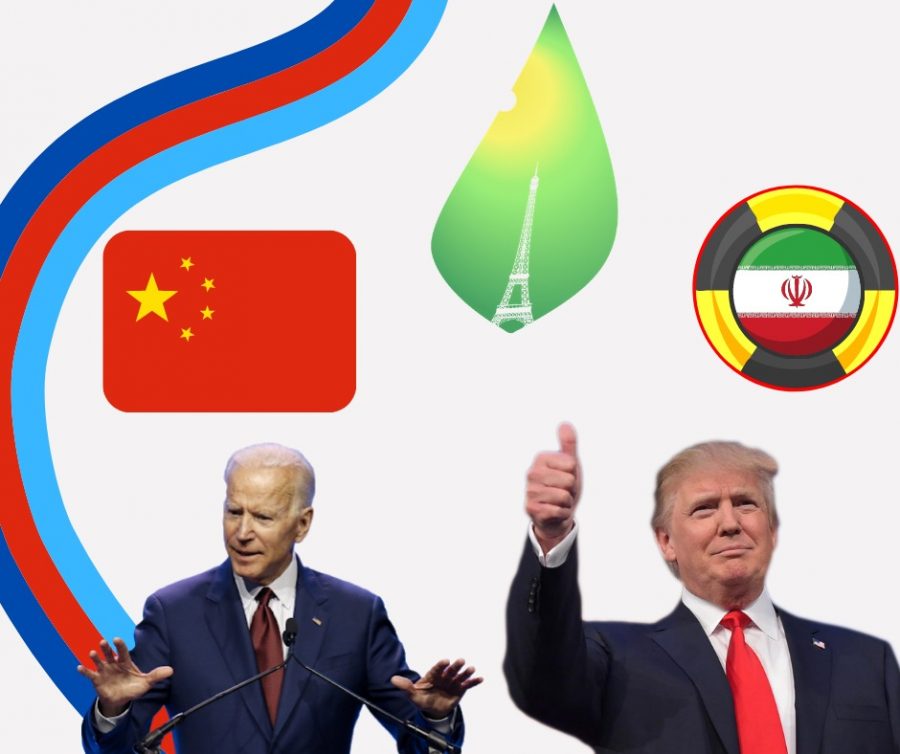Trump’s foreign policy is not one of peace, but Biden’s is
With election day coming up on Nov. 3, the possible outcomes of the election are being discussed on every news channel. It is important to know the key differences in foreign policy plans adopted by President Donald Trump and former Vice President Joe Biden, so here’s a look into whose plan is more apt in today’s global community.
Trump’s foreign policy tactics, or lack thereof, have been vastly criticized by a majority of the American people. According to a Pew Research Center article published on Oct. 1, 2018, 70 percent of Americans do not believe Trump takes into account the interests of foreign countries.
Time and time again, Trump has ignored human rights violations, including those in North Korea and China. He has praised authoritarian rulers from said countries in addition to Russian President Vladmir Putin and Turkish President Tayip Erdogan. The president has gone as far as praising Saudi Crown Prince Mohammed Bin Salman, a primary suspect in the case of the assassination of American Washington Post journalist Jamal Khashoggi.
On the polar opposite side, we have Biden’s foreign policy plan, which ensures that the United States promotes democratic values. Instead of adopting Trump’s “America First” rhetoric, Biden sees the value in a mutually beneficial global community. For example, the sitting president has described climate change as “mythical,” “non-existent” and an “expensive hoax.” These irrational viewpoints culminated in him backing out of the Paris Agreement on Climate Change Mitigation, an agreement put together to curb global greenhouse gas emissions. Meanwhile, Biden understands that climate change poses a substantial threat to the world. He has announced that under his presidency, the United States will rejoin the previously mentioned agreement, and has made it known that he is a staunch supporter of clean, renewable energy. Biden propagates the ideology that our environment and economy are completely connected. He believes that if we issue carbon taxes at more exorbitant rates, solar energy and other renewable energies will be utilized by a majority of corporations. This new increased use of clean energy will naturally bring about innovation in the field, making it more efficient and cost-effective.
Moreover, Biden has voiced his support for the Iran-Nuclear Deal put forth by the Obama-Biden campaign. The deal ensured that Iran reduced their uranium (basic fuel for nuclear weapons) stockpile by 98 percent, and disallowed their remaining uranium to be used for military purposes. Trump withdrew from the deal so that he could impose sanctions on Iran’s oil, as a response to their constant funding of extremist groups, such as Hamas. However, this was completely unnecessary as according to the parameters of the deal, the United States reserves the right to sanction Iran if they are defined as a state sponsor of terror. Heads of State of the United Kingdom, Germany and France have voiced approval for this landmark deal, which will be reinvigorated under a Biden administration.
This article would be incomplete if we were to ignore the People’s Republic of China. To be frank, neither Trump nor Biden has the perfect solution to this issue. But we cannot let perfect be the enemy of good. Trump has done nothing to curb the vast amount of human rights violations in China, whether it is in the case of the imprisonment of the Uighurs (a Muslim minority in the region), or the illegal expansion in the South China Sea Region. To explicate, the South China Sea is a waterbody bordering numerous Asian countries such as the Philippines, Malaysia, Brunei, Taiwan, Vietnam, Indonesia and China. It is a large pool of revenue, as a result of its abundance of wildlife and geography. A majority of world trade goes through the region, which permits the countries bordering it to claim taxes on ships passing through. The United Nations (UN) made parameters for each country to claim a part of the sea as their own. Each country claimed ownership of a portion of the sea 200 nautical miles from their coast, and they are in charge of regulating the economy in their waterbody as they please. Hence, each country gets an equal share of the profits of the South China Sea. China had other plans. They started to utilize their vast navy to create artificial islands in the middle of the South China Sea in order to extend their 200-mile claim and to create island military bases. China then decided not to abide by the 200-mile markings, and claimed a majority of the sea as their own, in the name of historical claims. No real action was taken by the Obama or Trump administration in this matter. Due to China’s immense global influence, numerous countries simply refused to take action against them.
Contrary to popular belief, the large U.S.-China trade war was a result of Trump accusing China of intellectual theft, not humanitarian reasons. Trump himself confirmed this as he imposed tariffs on $50 billion worth of Chinese goods. Trump has passed advertisements slandering Biden as China’s puppet, yet he has done nothing concrete to counter them himself. Moreover, Trump has described Chinese President Xi Jinping, a communist who has violated numerous human rights codes, as a “terrific guy” and “special person.” Consistently, Trump has failed to live up to the expectations he has set when dealing with China.
Biden, on the other hand, has put forth a plan to deal with China from an alternate approach. The crux of his plan is to decrease Chinese global influence by working with the same U.S. allies Trump has alienated. These allies include France, the United Kingdom, Canada and Australia. He believes working together in areas of mutual interest may bring about beneficial results for both countries, putting diplomacy and cooperation ahead of hard power. Our increased global influence will also allow the Biden administration to take whatever action is necessary for human rights violations in China.
The primary discrepancy with Biden’s idea of foreign policy is reliance on soft power (utilizing persuasive powers of diplomacy instead of relying on military deterrence). There is ample evidence to denounce diplomacy against a nation like China; however, overreliance on hard power is the biggest mistake the United States can make. China has recently started exponentially growing their global influence with soft power. The largest Chinese national bank, the Chinese Development Bank (CDB), gives more aid to developing countries than the World Bank. Instead of asking for high interest rates, they ask for access to markets and land in various countries in return for constant loans. If the United States continues to ignore the needs of their allies, then the world will find a new hegemony in China.
As Biden said, “Democracy is the root of our society, the wellspring of our power and the source of our renewal.” If you are truly interested in America’s political climate, see the merit in Biden’s foreign policy plans. As you cast your ballot, in these high-stakes elections, ask yourself, “How do I want the rest of the world to view America?”































Eric Hafter • Dec 4, 2020 at 6:16 pm
you can add the family separation policy at the border to the list of heartless policies promoted by the current occupant of the White House
Nati • Nov 3, 2020 at 10:45 am
U rlly popped off